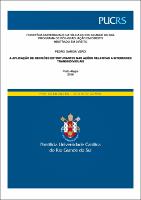| Compartilhe o registro |


|
Use este identificador para citar ou linkar para este item:
https://tede2.pucrs.br/tede2/handle/tede/8291Registro completo de metadados
| Campo DC | Valor | Idioma |
|---|---|---|
| dc.creator | Verdi, Pedro Garcia | - |
| dc.creator.Lattes | http://lattes.cnpq.br/8279250012499529 | por |
| dc.contributor.advisor1 | Tesheiner, José Maria Rosa | - |
| dc.contributor.advisor1Lattes | http://lattes.cnpq.br/8610959888090696 | por |
| dc.date.accessioned | 2018-09-25T12:15:24Z | - |
| dc.date.issued | 2016-03-29 | - |
| dc.identifier.uri | http://tede2.pucrs.br/tede2/handle/tede/8291 | - |
| dc.description.resumo | O presente trabalho parte da ideia de que a jurisdição, enquanto poder estatal necessita se adaptar à complexidade dos novos direitos e novas formas de litígio existentes na contemporaneidade. Tem por escopo estudar a aplicabilidade do instituto norte-americano das structural injunction como uma forma de conferir maior efetividade às tutelas de direitos transindividuais. Para isso optou-se, primeiramente, por traçar uma linha evolutiva sobre a função jurisdicional e sobre o processo civil, com a finalidade de se compreender o estágio em que se encontra e como emergem os direitos coletivos, assim como preparar o terreno para o entendimento da abertura a um sistema de tutelas coletivas. Superada esta primeira parte, cujo objetivo é introduzir o leitor no cenário em que o tema proposto atua, parte-se à análise das tutelas coletivas, seu surgimento e sua relevância no sistema jurídico atual. Paralelamente, com o fim de se compreender a atuação da jurisdição da atualidade, estuda-se, sob o título de “poderes do juiz”, o desenvolvimento da atividade jurisdicional desde a fase onde existia um juiz “boca da lei”, até o sistema atual, onde cumpre ao julgador mais do que simplesmente aplicar a lei, mas exercer uma atividade intelectual e interpretativa, tornando-o criador do Direito. Ao final, estuda-se o instituto das structural injunction, partindo de sua concepção no Direito norte-americano, para se propor a aplicabilidade no Direito brasileiro, o que se faz a partir da análise de casos concretos. | por |
| dc.description.abstract | This work starts from the idea that jurisdiction, while state power, needs to adapt to the complexity of new rights and new forms of existing dispute nowadays. Its scope study the applicability of the North American Institute of structural injunction as a way to give greater effect to the guardianships of transindividual rights. For this it was decided, first, to trace an evolutionary line of the judicial function and the civil process in order to understand the stage it is in and how emerge collective rights, as well as pave the way for understanding the opening to a collective guardianship system. Overcome this first part, which aims to introduce the reader in the scenario where the theme works part to the analysis of collective guardianships, its appearance and its relevance in the current legal system. In parallel, in order to understand the performance of today's jurisdiction, it is studied under the title of "judge's powers" the development of judicial activity from the stage where there was a judge "mouth of the law" to the current system where meets to judge more than simply applying the law, but an intellectual exercise and interpretive activity, making it the creator of the law. Finally, we study the Institute of structural injunction, from its conception in the American law, to propose the applicability in brazilian law, which is based on the analysis of concrete cases. | eng |
| dc.description.provenance | Submitted by PPG Direito ([email protected]) on 2018-09-24T14:52:32Z No. of bitstreams: 1 PEDRO_GARCIA_VERDI_DIS.pdf: 1053002 bytes, checksum: 5f1652326b54bc5e76d9847c43ecf63c (MD5) | eng |
| dc.description.provenance | Approved for entry into archive by Sheila Dias ([email protected]) on 2018-09-25T12:10:17Z (GMT) No. of bitstreams: 1 PEDRO_GARCIA_VERDI_DIS.pdf: 1053002 bytes, checksum: 5f1652326b54bc5e76d9847c43ecf63c (MD5) | eng |
| dc.description.provenance | Made available in DSpace on 2018-09-25T12:15:24Z (GMT). No. of bitstreams: 1 PEDRO_GARCIA_VERDI_DIS.pdf: 1053002 bytes, checksum: 5f1652326b54bc5e76d9847c43ecf63c (MD5) Previous issue date: 2016-03-29 | eng |
| dc.description.sponsorship | Coordenação de Aperfeiçoamento de Pessoal de Nível Superior - CAPES | por |
| dc.format | application/pdf | * |
| dc.thumbnail.url | http://tede2.pucrs.br:80/tede2/retrieve/173245/PEDRO_GARCIA_VERDI_DIS.pdf.jpg | * |
| dc.language | por | por |
| dc.publisher | Pontifícia Universidade Católica do Rio Grande do Sul | por |
| dc.publisher.department | Escola de Direito | por |
| dc.publisher.country | Brasil | por |
| dc.publisher.initials | PUCRS | por |
| dc.publisher.program | Programa de Pós-Graduação em Direito | por |
| dc.rights | Acesso Aberto | por |
| dc.subject | Medidas Estruturantes | por |
| dc.subject | Tutelas Coletivas | por |
| dc.subject | Poderes do Juiz | por |
| dc.subject | Structural Injunction | eng |
| dc.subject | Class Actions | eng |
| dc.subject | Judge’s Power | eng |
| dc.subject.cnpq | CIENCIAS SOCIAIS APLICADAS::DIREITO | por |
| dc.title | A aplicação de decisões estruturantes nas ações relativas a interesses transindividuais | por |
| dc.type | Dissertação | por |
| dc.restricao.situacao | Trabalho não apresenta restrição para publicação | por |
| Aparece nas coleções: | Programa de Pós-Graduação em Direito | |
Arquivos associados a este item:
| Arquivo | Descrição | Tamanho | Formato | |
|---|---|---|---|---|
| PEDRO_GARCIA_VERDI_DIS.pdf | PEDRO_GARCIA_VERDI_DIS | 1,03 MB | Adobe PDF |  Baixar/Abrir Pré-Visualizar |
Os itens no repositório estão protegidos por copyright, com todos os direitos reservados, salvo quando é indicado o contrário.




